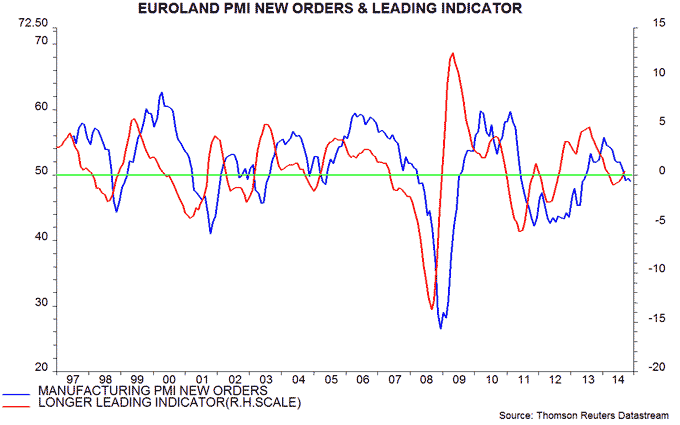Eurozone cycle probably turning up despite soft PMI
ECB President Mario Draghi last week expressed pessimism about near-term Eurozone economic prospects, citing a weak November “flash” purchasing managers’ survey. The survey, he said, “suggests a stronger recovery is unlikely in the coming months, with new orders falling for the first time since July 2013”.
President Draghi’s comment refers to the Markit Economics “composite” PMI survey covering services and manufacturing. This survey, in fact, is hugely overrated as a forecasting tool. Historically, even the new orders component has been, at best, a coincident indicator of the cycle.
The last Eurozone recession, for example, ended in the first quarter of 2013, with GDP growing by 0.3% in the second quarter. The PMI composite new orders index, however, remained below the “break-even” 50 level until mid-2013.
This year, the composite PMI has been misleadingly strong until recently. Based on the July survey, Markit Economics estimated that Eurozone GDP had grown by 0.4% in the second quarter while German GDP was on course for a 0.7-0.8% third-quarter rise. The outturns were 0.1% and 0.1% respectively. The PMI has now reset lower in line with actual economic results.
The November fall in the composite new orders measure reflected weakness in the services component. Manufacturing new orders are judged here to be a better coincident indicator of the cycle and have been stable since September. The longer leading indicator suggests a coming rise – see chart. Today’s German Ifo survey for November, showing the first increase in manufacturing expectations for seven months, is an encouraging sign.
UK experience demonstrates the perils of using the services PMI as a forecasting guide. The survey suggested that the economy was heading into a “triple-dip” recession in early 2013: the new business component fell below 50 in November and December 2012, prompting Markit Economics to opine that “activity may continue to fall in the new year”. GDP rose by 0.5% in the first quarter of 2013.
President Draghi, of course, will be aware of these issues. He may or may not believe that “a stronger recovery is unlikely in the coming months” but it suits his purpose to draw attention to PMI weakness to make the case for further monetary policy easing. An ECB leadership bent on further stimulus when monetary trends are improving and the economic cycle is turning up suggests a benign backdrop for equities.

Reader Comments